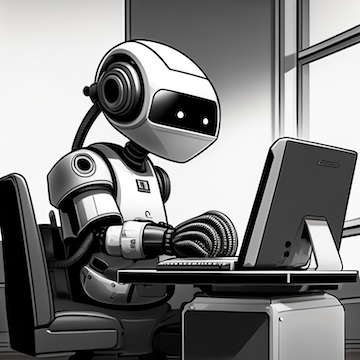Will AI take my job?
Jun 13th, 2023

“AI will take your job, it’s just a matter of time”
— Random doomsayer
If you’ve ever lost a job to a toaster, I feel for you. It’s tough. But let’s be serious for a moment—the rise of AI is undeniable. Does that mean knowledge-based jobs will be replaced by AI? I don’t think so.
For the sake of argument, let’s assume I’m completely wrong and AI does, in fact, take every creative job. If that were to happen, and we all morph into professional couch potatoes within the next 2-3 years, who’s going to cover our Netflix subscriptions and pizza delivery? Precisely, no jobs equals no economy.
I’ve heard speculations about a potential universal income. I don’t see that happening in a million years, but if it were to come true, you’d be free to pursue your interests. That’s not a bad outcome.
The most likely scenario is that we will adapt and thrive, just as we did with previous technological revolutions. We are a remarkably resilient species. If anything, I firmly believe AI will serve as an augmentation tool.
When GPT-4 was announced, OpenAI included results of how the model performed on various types of exams. For instance, it passed the BAR exam and would have scored in top 10 percentile. As I said before, it will only get better with time.
But does that mean anyone using ChatGPT is now a lawyer? Not exactly. I could technically ask it to draft a contract for me, but how would I know if the contract is even legal? The issue is that I don’t know what I don’t know. I still need an attorney.
The notion is just as absurd as believing that anyone watching YouTube is now a plumber. There are literally step-by-step guides to perform any repairs you need. Yet, the last time I needed a plumber, I struggled to find one who was available.
Knowledge has always been freely available, even before the internet. And it’s not the only reason we hire experts. We also seek their experience with a particular task, the speed at which they can perform it, assurance that if something goes wrong, they’ll know how to fix it, or simply because we aren’t interested in doing the task ourselves.
Now, an expert using these tools can significantly boost their productivity. Which leads me to another common concern:
“Fewer employees are going to be needed.”
— Another random doomsayer
Technically, you only need a single employee to run any company. You won’t go fast, but it’s possible.
Companies hire employees to increase efficiency, scale the business, and improve their pace relative to competitors. You see, competition is like the to the cold war—you’re trying to outdo your enemies. The only difference is that, in this case, we all have access to the same weapons. If you want to win the war, you will need a bigger army.
At every company I’ve been part of, we’ve always had more ideas than we had capacity to execute them. If these tools become mainstream — which I believe they will — they would make products more complex and feature-rich, not cheaper and minimalistic.
As someone who uses this technology daily, I can confidently say that while it has significantly increased my productivity in some areas, it has made no change in others.
So here’s my 2 cents: few jobs will be automated, productivity will increase, and yes, you will still need to hire a lawyer.